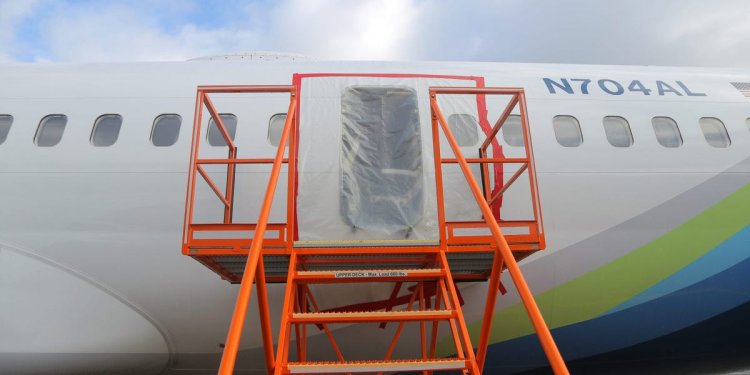Boeing could face criminal prosecution as DoJ reviews deferred prosecution agreement, report says
The company made the agreement in 2021 following two 737 Max 8 crashes in 2018 and 2019, which killed 346 people.

NTSB via Getty Images
- Boeing reached a deferred prosecution agreement with the DoJ in 2021.
- It admitted to deceiving regulators about the 737 Max aircraft.
- The DoJ is now reviewing whether the Alaska Airlines blowout violated the deal, Bloomberg reported.
Boeing could face criminal prosecution after the Justice Department reviews whether the Alaska Airlines blowout breaches the terms of a key agreement, Bloomberg reported, citing a person familiar with the matter.
The unnamed source said the department was reviewing whether the incident violated a 2021 deferred prosecution agreement, which is where a "company is charged with a criminal offence but proceedings are automatically suspended," subject to conditions.
Boeing and the government reached the agreement following two 737 Max 8 crashes in 2018 and 2019, which killed 346 people.
The manufacturer was charged with fraud conspiracy over the crashes as it admitted it misled the Federal Aviation Administration in relation to a part called the Maneuvering Characteristics Augmentation System (MCAS), which impacted the aircraft's flight control system, the DoJ said in a press release.
The feature was designed to stabilize the plane in case of an excessive angle of attack. However, pilots were not properly informed about the MCAS software in training for the Max.
David Burns, a former acting assistant attorney general of the Justice Department's criminal division, said the crashes "exposed fraudulent and deceptive conduct by employees."
"Boeing's employees chose the path of profit over candor by concealing material information from the FAA concerning the operation of its 737 Max airplane and engaging in an effort to cover up their deception," he added.
Boeing agreed to pay $2.5 billion as part of the settlement, most of which was compensation for the victims' families.
It also agreed to strengthen its compliance program and to more stringent compliance reporting requirements.
The deferred prosecution agreement expired two days after the Alaska Airlines blowout, the Bloomberg report said.
But the DoJ is now examining whether the company met the conditions of the deal, and it has six months to make a decision, the report added.
The National Transportation Safety Board found in its preliminary report that the Max 9 — delivered just 66 days earlier — left Boeing's factory without key bolts.
If the DoJ finds that the blowout breaches the settlement, Boeing could face criminal liability, the source told Bloomberg.
Boeing declined to comment on the report.
The DoJ did not immediately respond to a request for comment from Business Insider, which was sent outside US working hours.
What's Your Reaction?




















